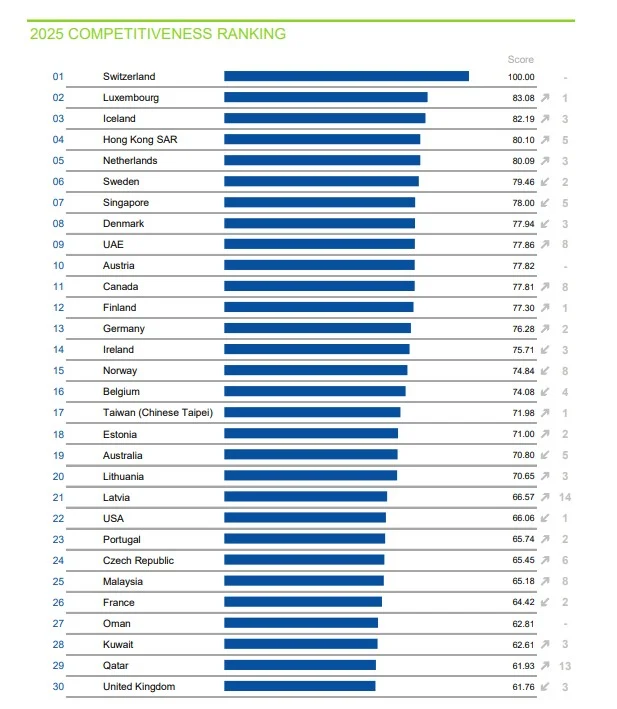Singapore falls five places in 2025 IMD World Talent Ranking amid rising costs and low education spending
Singapore has fallen five places to seventh in the 2025 IMD World Talent Ranking, losing its position as Asia’s top performer to Hong Kong. Rising living costs and low public spending on education were cited as key reasons for the decline.

- Singapore dropped from second to seventh in the 2025 IMD World Talent Ranking, overtaken by Hong Kong as Asia’s top performer.
- IMD cited low education spending and high living costs as key factors weakening Singapore’s talent appeal.
- Despite the decline, Singapore maintained strong readiness in workforce skills and ranked second in the IMD World Competitiveness Ranking.
Singapore has fallen five spots to seventh place in the 2025 IMD World Talent Ranking, released on 9 September, marking a setback in its ability to attract, develop and retain skilled professionals. The latest results also saw Hong Kong overtake Singapore as Asia’s top performer, climbing to fourth place in the global standings.
The ranking, compiled by the Swiss-based IMD World Competitiveness Center, assessed 69 economies using both statistical data and survey responses from more than 6,000 executives worldwide. It evaluates three pillars — investment and development, appeal, and readiness — to measure each country’s talent environment. Switzerland retained the top position, followed by Luxembourg and Iceland.
Singapore’s steepest fall came in the investment and development category, which tracks factors such as education spending, pupil-to-teacher ratios and apprenticeship opportunities. The country dropped from 22nd place in 2024 to 30th in 2025, with IMD noting that public expenditure on education made up just 2.1 per cent of GDP — ranking Singapore 63rd in this indicator.
Cost pressures were another major factor behind the decline. Under the appeal pillar, which measures how attractive a country is to foreign professionals, Singapore ranked 65th for cost of living. IMD director Arturo Bris said at a press conference that rising living costs were making it increasingly difficult for professionals to stay in the country. “While Singapore offers an excellent business environment, the cost of living has become a real challenge for both local and foreign talent,” he said.
Despite these challenges, Singapore continued to perform strongly in the readiness pillar, which gauges how well the education system prepares the workforce. It slipped only one position to second place. Executives surveyed by IMD said Singapore’s primary and secondary education systems remain closely aligned with the needs of a competitive economy. The report highlighted the country’s high proportion of science graduates, strong participation by international students, and consistently strong results in the OECD’s PISA survey of 15-year-olds.
Even so, regional shifts in business activity are affecting Singapore’s position as a talent hub. IMD executive education dean Professor Misiek Piskorski noted that some firms have been relocating to lower-cost neighbouring countries such as Malaysia, Thailand and Vietnam. “It’s not necessarily that the talent itself is leaving,” he said. “It’s that many organisations are leaving, and the talent follows with them.”
He added that Singapore has a proven record of adaptability and could recover quickly with a “well thought-out plan” to reattract global talent. “Singapore has always been strategic in its long-term planning,” Prof Piskorski said. “We expect the same approach will help it regain ground in future rankings.”
Other Asian economies performed strongly in this year’s index. The United Arab Emirates secured ninth place, praised for its competitive private sector and success in attracting international students. Hong Kong received commendation for its “outstanding” academic performance and high student mobility. Taiwan ranked 17th, Malaysia 25th, South Korea 37th and China 38th.

The IMD also released its 2025 World Competitiveness Ranking alongside the talent report, where Singapore maintained second place globally. Despite this strong overall showing, the country saw modest declines in several areas. It improved in economic performance, rising to first place thanks to GDP growth, strong capital formation and robust exports.
However, Singapore’s business efficiency ranking fell sharply from second to eighth. IMD attributed this drop to weaker management practices, slower digital transformation and reduced entrepreneurial activity. The report also noted a decline in infrastructure, particularly in education, where Singapore fell from third to eighth. The low share of GDP allocated to public education, relatively low female degree attainment, and moderate university rankings contributed to this result.
Government efficiency remained a bright spot, ranking third worldwide. IMD credited Singapore with sound fiscal management, transparent governance and balanced tax policies, which continue to underpin its competitiveness.
While Singapore’s overall global competitiveness remains resilient, IMD warned that rising living costs and limited investment in education are emerging as long-term challenges. Analysts said that unless these issues are addressed, Singapore could face growing difficulty attracting the next generation of skilled workers and business leaders.
The IMD report concluded that addressing cost pressures and strengthening the education system will be critical for Singapore to sustain its reputation as a leading hub for talent and innovation.







